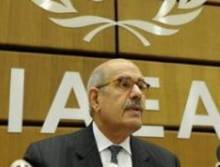 An Egyptian opposition leader is warning the president’s call for parliamentary elections in April will only inflame the country’s political tensions.
An Egyptian opposition leader is warning the president’s call for parliamentary elections in April will only inflame the country’s political tensions.
Mohamed ElBaradei, who leads the main opposition National Salvation Front, wrote on his Twitter account Friday that President Mohammed Morsi’s “decision to go for parliamentary elections amidst severe societal polarization and eroding state authority is a recipe for disaster.”
ElBaradei’s group has already warned it would boycott the vote unless there are talks with the president aimed at real reconciliation. It has also said it will boycott if election laws written by the Islamist-led interim parliament favor Morsi’s Muslim Brotherhood party.
The Brotherhood has consistently won at the ballot box since Egypt’s uprising two years ago while the mostly secular and liberal opposition has trailed significantly behind.
Egypt’s Islamist president has called parliamentary elections for April in an effort to assuage mounting frustration over continued turmoil on the streets and a political impasse that has gripped the nation.
A decree by President Mohammed Morsi issued late Thursday set the start of a staggered, four-stage voting process for April 27, with the last round to be held in June. The newly elected parliament would then convene for its first session on July 6, the decree said.
Since the 2011 ouster of longtime authoritarian President Hosni Mubarak in a popular uprising that was part of the Arab Spring revolts, Egyptians have gone through a series of referendums, presidential and parliamentary elections. The first elected parliament was disbanded by a court order last June and Morsi, the nation’s first freely elected president, assumed his post in July.
Morsi and his highly organized Muslim Brotherhood, which was a banned opposition group under Mubarak, emerged from the uprising and the various elections as the country’s dominant political group with the largest grass root support.
But the divisions in Egypt have only grown, pitting the Brotherhood and their fundamentalist Islamists allies on one side and the mostly secular, liberal political parties and youth groups on the other.
The opposition accuses Morsi of monopolizing power and going back on campaign promises to have an inclusive government and introduce far reaching reforms. Morsi’s supporters say the new government cannot immediately fix years of neglect and poor administration from Mubarak’s 29-year rule, and cite the legitimacy of the ballot box in their favor.
The turmoil deepened with the second anniversary of the Jan. 25 uprising when anger spilled out onto the streets and violence again engulfed the nation.
The most recent show of unrest came in the restive city of Port Said, where a general strike entered its six day on Friday. Factory workers, activists and laborers have held street rallies that brought the coastal city on the northern tip of the Suez Canal to a halt, though shipping in the international waterway has not been affected.
Meanwhile, rights groups have complained of widespread police abuse, saying in a joint statement Wednesday that brutality is on the rise in detention centers and at demonstrations. The groups said they hold Morsi responsible for failing to stop such practices, which have claimed 60 lives since the end of January.
For its part, Egypt’s powerful military has shown signs of growing impatience with Morsi, issuing thinly veiled threats that it might seize power again as it did after Mubarak stepped down and the army generals took over, remaining in control until Morsi’s election.
After several spasms of deadly violence on the streets, a decimated economy and depleted foreign reserves, many hold Morsi responsible for the turmoil.
His critics say he is not much different from Mubarak, pointing to a highly controversial presidential decree from November in which Morsi gave himself near absolute powers. The decree has since been rescinded but Morsi and the Brotherhood in the meantime managed to push through a constitution — drafted by an Islamist-dominated panel — that was approved in a referendum late last year.
According to Thursday’s decree, Egypt’s 27 provinces will be divided into four groups that will vote separately over two days over a period ending on June 27. This is allegedly to give the more than 50 million voters enough time to participate in the balloting.
Egypt’s previous, Islamist-dominated parliament was disbanded on June 14, after the Supreme Constitutional Court ruled on the grounds that a third of the chamber members were elected illegally.
The country’s biggest opposition grouping, The National Salvation Front, has said it will not take part in the elections unless Morsi meets their demands to form a national unity government that would guarantee fair and free elections.
Time

Leave a Reply
You must be logged in to post a comment.